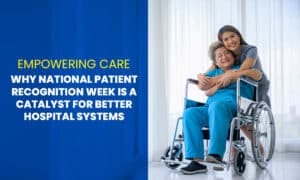
In 2025, hospitals and clinics face a mounting challenge: how to manage their workforce efficiently while staying compliant and patient-focused. With complex shift structures, increasing demand for accountability, and value-based care models gaining ground, healthcare professional schedule management has become a top priority for healthcare administrators.
Hospitals can no longer afford to rely on outdated methods. Manual scheduling and spreadsheets lead to inefficiencies, staff dissatisfaction, and compliance violations. Healthcare facilities must adopt modern hospital healthcare professional scheduling software that supports smart planning, real-time communication, and regulatory alignment.
Why Healthcare Professional Scheduling Matters in 2025
Healthcare professional schedule management isn’t just about plugging in names to time slots. It’s about aligning workforce capacity with fluctuating patient needs, minimising burnout, and ensuring operational efficiency. Hospitals that lack effective scheduling tools experience shift conflicts, staff shortages, and lowered patient care standards.
With compliance-driven scheduling and healthcare professional management now mandated by various regulatory bodies, failing to meet work-hour limitations or leave policies can cost a hospital more than just staff morale. It can impact accreditation, reimbursements, and legal exposure.
To stay competitive and sustainable, hospitals must integrate technology that not only manages rosters but empowers clinical leaders with analytics and forecasting tools.
Key Features Hospitals Must Look for in Scheduling Software

Selecting the best healthcare professional scheduling software requires a strategic approach. Here are must-have features for 2025:
• AI-powered Automated Shift Planning
Uses artificial intelligence to generate optimal shift patterns based on staff availability, workload balance, and patient volume forecasts—reducing human error and administrative time.
• Predictive Analytics for Workforce Forecasting
Leverages historical data and trends to anticipate future healthcare professional needs, allowing hospitals to plan schedules proactively and reduce last-minute changes.
• Real-Time Schedule Changes and Mobile App Access
Enables administrators and staff to view, modify, and accept shifts instantly via mobile, improving communication and minimising scheduling delays or confusion.
• Integration with EHR, Payroll, and HR Systems
Ensures seamless flow of scheduling data across critical systems, eliminating duplication of effort and enhancing operational visibility for HR, finance, and care teams.
• Compliance Alerts for Shift Rules and Staffing Ratios
Automatically flags violations related to labour laws, staffing quotas, and fatigue rules—helping hospitals maintain compliance and reduce legal risks.
• Approval Workflows and Role-Based Access
Enforces multi-level approval protocols and restricts access to sensitive data based on user roles, ensuring transparency, accountability, and security across departments.
Best Healthcare Professional Scheduling Software in 2025
Below is a side-by-side comparison of top-performing software tools designed for hospital environments:
| S.No | Software | Key Features | Best For | Integration Support |
| 1 | Ezovion HRMS | AI-based scheduling, compliance tools, dashboards | Multi-specialty hospitals and clinics | EHR, HRMS, Billing |
| 2 | Kronos Workforce Scheduler | Automated planning, labor law compliance | Enterprise healthcare networks | Payroll, ERP, EHR |
| 3 | ShiftWizard by HealthStream | Staff communication, credential tracking | Nursing departments and shift-heavy units | HR & Credentialing |
| 4 | QGenda | Real-time schedule access, credential rules | Physician groups and teaching hospitals | EHR, Time Tracking |
| 5 | Deputy for Healthcare | Mobile-friendly, AI shift optimizer | Small to mid-sized healthcare providers | POS, HR, Timesheets |
Trends Shaping Healthcare Professional Scheduling in Healthcare
As healthcare evolves, scheduling must too. Current trends include:
• AI and automation for shift suggestions.
• Cloud-based platforms for decentralised scheduling.
• Focus on clinician well-being and fair workload distribution.
• Integration of compliance-driven scheduling and healthcare professional management with reimbursement frameworks.
• Enhanced coordination across departments for optimal resource use.
Modern healthcare scheduling software must offer adaptive planning to suit changing patient loads, staffing levels, and government requirements. Healthcare professional schedule management tools with real-time analytics help hospitals make data-informed staffing decisions.
ROI & Operational Benefits for Hospitals
Healthcare professional schedule management brings measurable value. Hospitals using automated healthcare professional scheduling software report the following benefits:
• 30% reduction in scheduling conflicts
• 20% increase in employee satisfaction
• 35% improvement in on-time shift fulfilment
• Significant reduction in overtime costs
Additionally, when using systems designed for compliance-driven scheduling and healthcare professional management, hospitals maintain accurate audit trails, meet labour laws, and minimise litigation risks.
Benefit
| S.No | Benefit | With Traditional Scheduling | With Modern Software |
| 1 | Shift Fulfillment Rate | 60-70% | 90-95% |
| 2 | Manual Adjustment Time | 3-4 hours/week | Under 30 minutes |
| 3 | Regulatory Compliance Errors | Frequent | Minimal to none |
| 4 | Staff Satisfaction | Low | High due to transparency & fairness |
Modern hospital operations demand high efficiency, and healthcare professional schedule management plays a pivotal role in meeting this goal. The comparison between traditional scheduling methods and advanced healthcare professional scheduling software clearly highlights the advantages of digital transformation in healthcare workforce planning.
Shift fulfilment rate is a critical metric. With traditional scheduling, fulfilment rates often remain between 60–70%, primarily due to manual errors, poor visibility, and slow communication. However, healthcare professional scheduling software can boost this rate to 90–95%, thanks to real-time updates, predictive staffing algorithms, and mobile notifications that keep everyone informed and on the same page.
Manual adjustment time is another pain point. Traditionally, hospital managers spend 3–4 hours each week revising schedules to accommodate sick leaves, shift swaps, or regulatory changes. In contrast, modern healthcare professional management tools allow automated reassignments and drag-and-drop interfaces, reducing adjustment time to under 30 minutes.
Compliance issues also plague manual systems. Traditional methods often result in frequent violations of labour laws or accreditation standards due to a lack of rule-based scheduling. Healthcare professional software comes equipped with compliance-driven rules engines that drastically reduce regulatory errors, ensuring smooth audits and continued accreditation.
Perhaps most importantly, staff satisfaction increases significantly. Transparency, fairness in shift distribution, and the ability to manage preferences via mobile apps contribute to a happier and more motivated workforce.
For hospitals and clinics looking to optimise operations and ensure quality care, investing in effective healthcare professional schedule management solutions is no longer optional—it’s a necessity.
How Ezovion Simplifies Staff Scheduling for Healthcare Providers
Ezovion is one of the best healthcare professional software with robust capabilities tailored for Indian and global healthcare providers. With a built-in AI engine, Ezovion automates shift assignments based on skill sets, availability, and compliance requirements.
The intuitive dashboard provides complete visibility to administrators, while the mobile app empowers staff to view and swap shifts in real-time. Ezovion’s scheduling software supports integration with payroll, attendance, HRMS—making it a centralised solution.
Its tools help facilities meet compliance-driven scheduling and healthcare professional management by tracking leave, on-call hours, and licencing requirements. This level of automation reduces the load on admin staff and keeps the workforce aligned with service goals.
Conclusion
In a dynamic healthcare landscape, healthcare professional schedule management has become indispensable. Adopting advanced healthcare scheduling software helps hospitals achieve operational excellence, boost staff morale, and ensure regulatory compliance.
Platforms like Ezovion stand out as affordable healthcare professional scheduling solutions, providing smart tools for automated planning, real-time updates, and integrated compliance checks. With increasing demands on healthcare infrastructure, investing in the right scheduling software is not a luxury—it’s a necessity.
As we move into the second half of the decade, hospitals that leverage automated healthcare professional scheduling software for healthcare facilities will lead the way in delivering timely, effective, and value-driven care.





